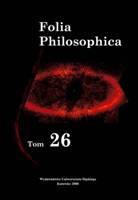Nominalism and the main theses of "Prince" by Niccolò Machiavelli
Nominalizm a główne tezy "Księcia" Niccola Machiavellego
Author(s): Radosław MałekSubject(s): Philosophy
Published by: Wydawnictwo Uniwersytetu Śląskiego
Keywords: nominalism; politics; individual; community; liberalism
Summary/Abstract: In general, the fundamental problem for the philosophy of politics is taking a stand in the argument: man as an individual (and the conception of ego) and community. Apriorically, this assumption is the basis for the whole thought construction of all points of view in the philosophy of politics. The author of the article makes an attempt to prove that Machiavelli, representing a nominalistic standpoint, gives the basis for the underpinnings of the philosophy of liberalism. The author of "Prince" “deprives the world of its illusions”. His method of perceiving the world consists in the synthesis of sensual impressions and search for the confirmation of these syntheses in the interpretation of historical events. "Prince" is based on this method. It constitutes a type of a catechism of behaviours by means of which we can achieve success in ruling out (success can be achieved by anyone if he/she learns well the mechanism operating in the surrounding world) and, thus, virtu is more important than a fortune. If an individual obeys the rules from "Prince" and rules (being bad from time to time), achieves success, but this success is at the same time the peace for the mass. It does not matter if the "Prince" rules out well. What matters is the plebs’ conviction that the "Prince" rules out well and does not rebel making any revolts. The evil (deceit, fraud, the lack of intention of realizing any values) is sometimes blissful and lead to the good (the peace of the subjects). That is what the world is, was, and will be about. It is honest in this strange sense of the word (after all one can learn this "Prince").
Journal: Folia Philosophica
- Issue Year: 2008
- Issue No: 26
- Page Range: 365-373
- Page Count: 9
- Language: Polish

